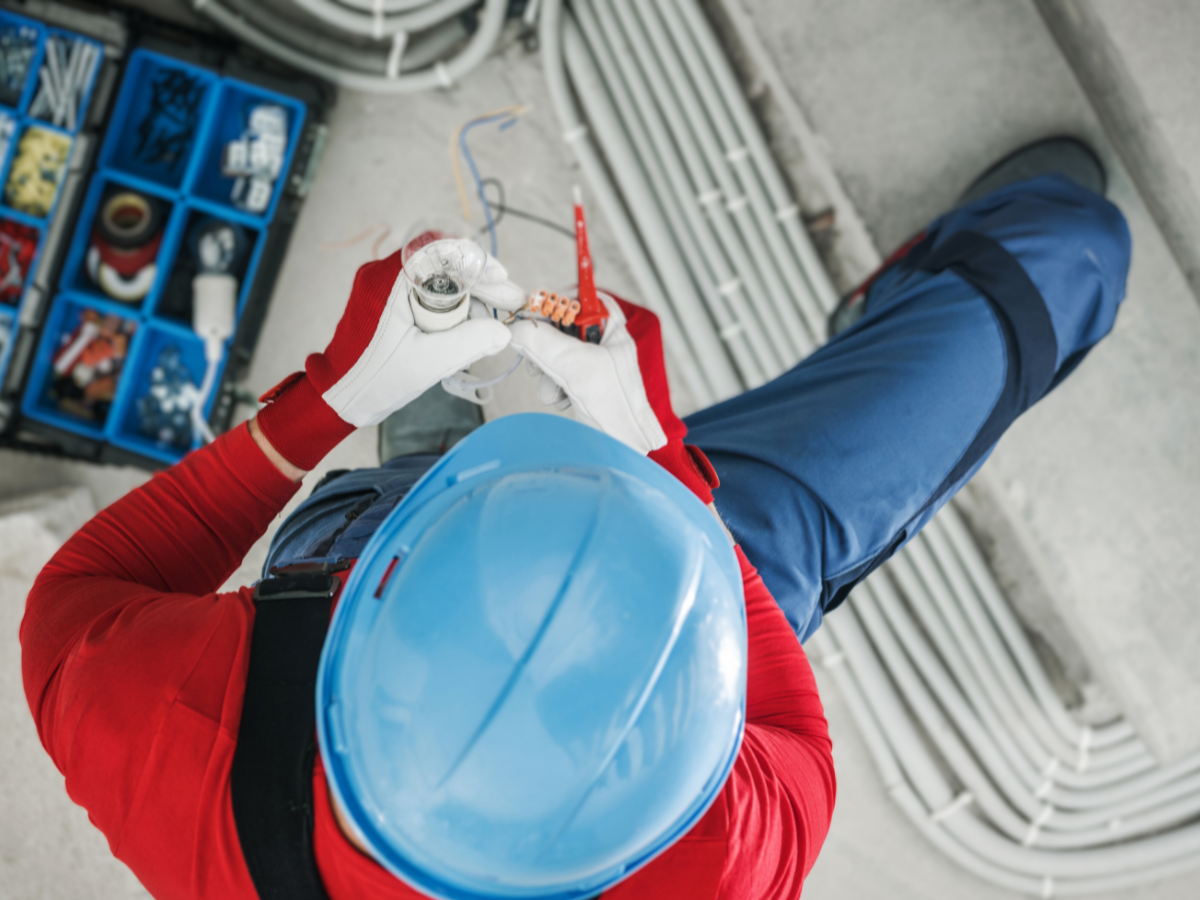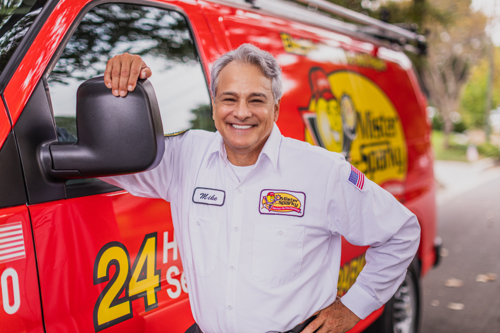 Understanding the differences between residential and commercial electricians is important when tackling electrical work. Electricians come in various specializations, and while both residential and commercial electricians focus on installing, maintaining, and repairing electrical systems, their work environments and challenges set them apart.
Understanding the differences between residential and commercial electricians is important when tackling electrical work. Electricians come in various specializations, and while both residential and commercial electricians focus on installing, maintaining, and repairing electrical systems, their work environments and challenges set them apart.
Residential electricians primarily handle homes, apartments, and small properties. Commercial electricians work on businesses, larger properties, and more complex systems.
This article will explore the skills, tools, and expertise of each type of electrician. By breaking down the key differences, we’ll help you figure out which professional is best suited for your specific needs.
Key Takeaways
- Both residential and commercial electricians have similar foundational skills but differ in the environments they work in.
- Residential electricians specialize in smaller-scale projects, such as wiring homes, while commercial electricians handle larger, more complicated jobs in businesses and commercial buildings.
- The tools and wiring systems used vary depending on the type of electrician, as each faces different power demands and safety requirements.
- Each type of electrician requires proper training and licensing to work on their respective projects.
Residential Electricians
Residential electricians are responsible for installing and maintaining the electrical systems inside homes. They focus on ensuring that homes and residential properties are safely wired and that homeowners have reliable power throughout their spaces.
Job Responsibilities
A residential electrician’s responsibilities cover everything from wiring new homes to repairing faulty electrical systems. They install and maintain outlets, light fixtures, wiring, and security systems. If a homeowner faces electrical issues, residential electricians troubleshoot the problem and provide solutions.
They also offer advice on energy-efficient upgrades, like installing LED lights or smart home devices, to make homes safer and more efficient.
Typical Projects
Residential electricians typically work on projects like wiring new homes, handling remodels, or adding outlets, switches, and light fixtures. They’re also responsible for installing smoke detectors, home security systems, and other electrical features that enhance safety and convenience.
These professionals are used to working in crawl spaces and attics, ensuring that everything is properly connected without disrupting the home’s overall structure.
Training and Licensing
To become a residential electrician, one needs a high school diploma or equivalent. After that, they complete a four-year apprenticeship program, learning hands-on electrical work and studying safety regulations.
This training is important, as it prepares them to follow the National Electrical Code (NEC) and local building codes. Once their apprenticeship is finished, they must pass a licensing exam to demonstrate their knowledge and skills.
Commercial Electricians
 Commercial electricians work on business properties, including offices, retail stores, and public buildings. Their work often involves more intricate systems, designed to handle larger power loads than those found in homes.
Commercial electricians work on business properties, including offices, retail stores, and public buildings. Their work often involves more intricate systems, designed to handle larger power loads than those found in homes.
Job Responsibilities
Commercial electricians are responsible for wiring new construction projects, like office buildings, and installing electrical systems that meet the needs of businesses.
They install outlets, switches, low voltage systems, and lighting. They also make sure security and communication systems work properly. They troubleshoot any electrical issues that arise and make recommendations to improve power efficiency and safety in commercial spaces.
Typical Projects
The projects commercial electricians work on include wiring new business properties, handling remodels, and installing electrical systems in office buildings and other commercial environments.
They often deal with larger wiring systems than those used in residential electrical work, as businesses require more power to run their operations. These electricians must be mindful of the added complexity that comes with handling the electrical needs of commercial spaces.
Training and Licensing
Commercial electricians undergo training similar to residential electricians but often require more specialized knowledge. Their four-year apprenticeship includes studying advanced electrical systems, like three-phase power, voltage balancing, and control systems.
Commercial electricians also have to pass exams based on the NEC, local codes, and additional safety standards, such as those set by OSHA, which are particularly relevant in the more demanding commercial environment.
Industrial Electricians
Industrial electricians take on large-scale electrical projects in factories, manufacturing plants, and power plants. Their work requires a high level of expertise, as they handle complex systems with much higher voltage than those found in residential or commercial settings.
Job Responsibilities
Industrial electricians manage the installation, maintenance, and repair of electrical systems that power industrial machinery and equipment. They troubleshoot high-voltage systems, identify potential hazards, and provide advice on maintaining electrical efficiency in these demanding environments.
Typical Projects
These electricians work on new constructions like factories and manufacturing plants, wiring high-voltage systems and setting up heavy-duty equipment.
They also handle remodels and upgrades, ensuring that industrial buildings are outfitted with safe, reliable electrical systems capable of meeting production needs.
Training and Licensing
The training for industrial electricians is more advanced than for residential or commercial electricians. In addition to a four-year apprenticeship, they receive specialized instruction on industrial electrical systems and safety regulations.
Industrial electricians must be familiar with the NEC, OSHA standards, and NFPA 70E, which focuses on electrical safety in industrial environments.
Tools Used by Electricians
Regardless of their specialization, all electricians rely on core tools to get the job done, such as multimeters, wire strippers, cable cutters, hole saws, and pipe benders. However, the tools they use differ based on their specific field.
- Residential Electricians: They tend to work with tools suited for lower voltage systems, like NM cable (Romex), pliers, and hand tools.
- Commercial Electricians: These professionals use tools built for mid-range voltage systems and typically work with EMT conduit, conduit benders, and heavier-duty equipment.
- Industrial Electricians: They handle tools made for high-voltage systems, such as flexible metal conduit (FMC), specialized diagnostic tools, and heavy-duty cutters.
Skills
Electricians across the board begin with the same foundational training, which involves apprenticeships, trade schools, or even engineering degrees. Commercial and industrial electricians often need additional training due to the more complex electrical systems they work on.
For commercial electricians, the knowledge of advanced electrical systems, like voltage balancing, control systems, and phase diagrams, is essential. Some states also require commercial electricians to complete over 4,000 hours of experience and pass specialized exams before they’re fully certified.
Electrical Compliance Standards
Electricians in all fields must adhere to a set of regulations and standards that ensure their work is safe and compliant.
- National Electrical Code (NEC): This code applies to all electricians and lays out safety standards for electrical installations.
- Local Building Codes: These differ depending on the location and the type of project—residential, commercial, or industrial.
- OSHA Safety Standards: These standards are especially important for commercial and industrial electricians, as they work in environments where the risks are higher. Safety protocols, protective equipment, and proper handling of electrical systems are key components of OSHA guidelines.
Wiring Methods
Wiring methods vary significantly depending on the environment.
- Residential Wiring: Residential electricians use non-metallic sheathed cable, like Romex, which is suited for the lower power demands in homes.
- Commercial Wiring: Commercial electricians work primarily with electrical metallic tubing (EMT), which is designed for higher power loads and more complex installations.
- Industrial Wiring: Industrial electricians often work with flexible metal conduit (FMC) to protect wiring in harsh conditions and to handle higher voltage demands.
Load Demands and Energy Needs
The power demands differ between residential, commercial, and industrial environments.
- Residential Electricians: They work with 120-volt circuits and single-phase systems, common in homes and small properties.
- Commercial Electricians: They handle 240-volt circuits and three-phase systems, which are necessary for powering larger commercial equipment and lighting systems.
- Industrial Electricians: Industrial electricians deal with the highest voltage systems, sometimes working with 480-volt or 600-volt circuits in three- or four-phase systems, required for heavy-duty machinery.
What Type of Electrician Do You Need?
Choosing the right electrician depends on the scope of your project.
- Residential Electricians: If you’re working on home wiring, remodels, or basic installations, a residential electrician is the best fit.
- Commercial Electricians: For office buildings, commercial remodels, and larger electrical systems, a commercial electrician is ideal.
- Industrial Electricians: If you need to wire a factory or maintain high-voltage systems, an industrial electrician is the professional for the job.
Why Choose Us
 If you’re located in Tampa, Florida, and need professional help with your electrical systems, Mister Sparky is your go-to expert.
If you’re located in Tampa, Florida, and need professional help with your electrical systems, Mister Sparky is your go-to expert.
We provide reliable residential and commercial electrical services, ensuring that your power needs are safely met. Mister Sparky is Tampa’s on-time electrician, so you never have to worry about delays when you need us most.
Final Thoughts
Knowing the distinctions between residential, commercial, and industrial electricians can help you make the right choice for your project. Each type of electrician brings specific skills, training, and tools to the table, suited for the environment they work in. Mister Sparky of Tampa offers expert guidance and services tailored to your unique needs, whether it’s for your home or business.
FAQs
When hiring an electrician, you may have some important questions. Below, we’ve answered some of the most common inquiries regarding residential and commercial electricians.
What sets a residential electrician apart from a commercial electrician?
Residential electricians specialize in homes, handling wiring, outlets, and lighting. Commercial electricians focus on business properties, dealing with more complex electrical systems.
Do commercial electricians receive more training than residential electricians?
Yes. While both require a strong foundation in electrical work, commercial electricians often undergo additional training to understand more complex systems like three-phase power.
Can a residential electrician take on commercial projects?
Although some residential electricians may have the licensing to work on commercial projects, it’s better to hire someone with specific expertise in commercial systems to handle larger projects.
What should I do if I have an electrical emergency at home?
If you experience an electrical emergency, contact a licensed residential electrician. They can diagnose the issue and repair it safely.
How quickly can a commercial electrician respond to an urgent issue?
Commercial electricians often have quick-response teams available to address emergencies in business settings. Mister Sparky in Tampa is known for responding promptly to electrical emergencies.
Who should I hire for a home remodel?
For home remodels, a residential electrician is the right choice. They have the expertise to install new wiring, outlets, and fixtures in residential settings.
Can a single electrician handle both residential and commercial work?
A: Some electricians are trained to handle both types of work, but it’s typically best to hire an electrician who specializes in the specific area of your project.